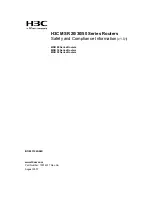
Virtual Router Redundancy Protocol (VRRP)
Virtual router redundancy protocol (VRRP) is designed to eliminate a single point of failure in a statically routed network.
VRRP Overview
VRRP is designed to eliminate a single point of failure in a statically routed network.
VRRP specifies a MASTER router that owns the next hop IP and MAC address for end stations on a local area network (LAN). The
MASTER router is chosen from the virtual routers by an election process and forwards packets sent to the next hop IP address. If the
MASTER router fails, VRRP begins the election process to choose a new MASTER router and that new MASTER continues routing traffic.
VRRP uses the virtual router identifier (VRID) to identify each virtual router configured. The IP address of the MASTER router is used as
the next hop address for all end stations on the LAN. The other routers the IP addresses represent are BACKUP routers.
VRRP packets are transmitted with the virtual router MAC address as the source MAC address. The MAC address is in the following
format: 00-00-5E-00-01-{VRID}. The first three octets are unchangeable. The next two octets (00-01) indicate the address block assigned
to the VRRP protocol, and are unchangeable. The final octet changes depending on the VRRP virtual router identifier and allows for up to
255 VRRP routers on a network.
The following example shows a typical network configuration using VRRP. Instead of configuring the hosts on the network 10.10.10.0 with
the IP address of either Router A or Router B as their default router; their default router is the IP address configured on the virtual router.
When any host on the LAN segment wants to access the Internet, it sends packets to the IP address of the virtual router.
In the following example, Router A is configured as the MASTER router. It is configured with the IP address of the virtual router and sends
any packets addressed to the virtual router through interface TenGigabitEthernet 1/1 to the Internet. As the BACKUP router, Router B is
also configured with the IP address of the virtual router. If, for any reason, Router A becomes unavailable, VRRP elects a new MASTER
Router. Router B assumes the duties of Router A and becomes the MASTER router. At that time, Router B responds to the packets sent to
the virtual IP address.
All workstations continue to use the IP address of the virtual router to address packets destined to the Internet. Router B receives and
forwards them on interface TenGigabitEthernet 10/1. Until Router A resumes operation, VRRP allows Router B to provide uninterrupted
service to the users on the LAN segment accessing the Internet.
For more detailed information about VRRP, refer to
RFC 2338, Virtual Router Redundancy Protocol
.
65
1084
Virtual Router Redundancy Protocol (VRRP)
Summary of Contents for S4048T-ON
Page 1: ...Dell Configuration Guide for the S4048 ON System 9 11 2 1 ...
Page 148: ...Figure 10 BFD Three Way Handshake State Changes 148 Bidirectional Forwarding Detection BFD ...
Page 251: ...Dell Control Plane Policing CoPP 251 ...
Page 363: ... RPM Synchronization GARP VLAN Registration Protocol GVRP 363 ...
Page 511: ...Figure 64 Inspecting the LAG Configuration Link Aggregation Control Protocol LACP 511 ...
Page 558: ...Figure 84 Configuring Interfaces for MSDP 558 Multicast Source Discovery Protocol MSDP ...
Page 559: ...Figure 85 Configuring OSPF and BGP for MSDP Multicast Source Discovery Protocol MSDP 559 ...
Page 564: ...Figure 88 MSDP Default Peer Scenario 2 564 Multicast Source Discovery Protocol MSDP ...
Page 565: ...Figure 89 MSDP Default Peer Scenario 3 Multicast Source Discovery Protocol MSDP 565 ...
Page 841: ...Figure 115 Single and Double Tag TPID Match Service Provider Bridging 841 ...
Page 842: ...Figure 116 Single and Double Tag First byte TPID Match 842 Service Provider Bridging ...
















































